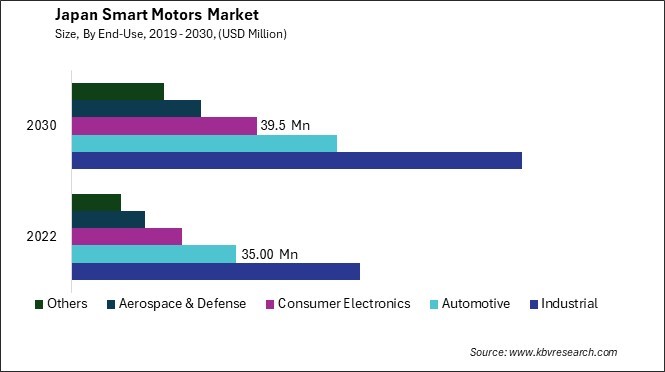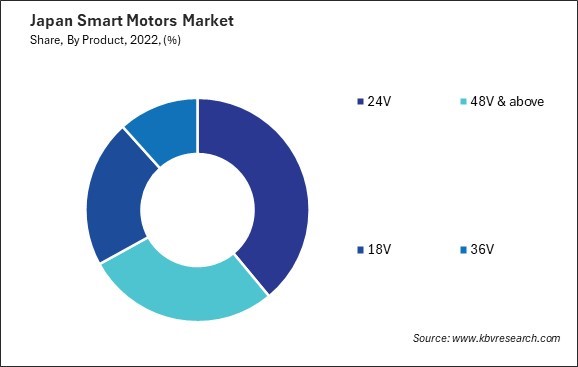The Japan Smart Motors Market size is expected to reach $238.7 Million by 2030, rising at a market growth of 6.5% CAGR during the forecast period.
Japan's smart motors market has witnessed significant growth in recent years. Renowned for its innovative technologies and robust manufacturing sector, Japan has been at the forefront of adopting smart motor solutions across industries such as automotive, manufacturing, healthcare, and consumer electronics. The automotive industry has been a key driver of smart motor adoption, with Japanese automotive manufacturers integrating smart motors into vehicles for improved performance and energy efficiency.

One of the key drivers of the smart motors market in Japan is the country's strong manufacturing sector. Japan has a long history of innovation in manufacturing and is home to many leading companies in industries such as automotive, electronics, and robotics. These industries are increasingly adopting smart motor technology to improve efficiency, reduce downtime, and enhance product quality. For example, in the automotive industry, smart motors are used in various applications such as electric power steering systems, engine cooling fans, and HVAC systems.
In addition to industrial applications, smart motors are also gaining traction in the consumer electronics industry in Japan. With the growing popularity of smart home devices and appliances, there is a rising demand for energy-efficient motors that power these products while offering seamless connectivity and intelligent control features. For instance, smart motors are used in air conditioners, refrigerators, washing machines, and other household appliances to improve energy efficiency, reduce noise levels, and enhance user experience.
The COVID-19 pandemic has significantly impacted the smart motors market in Japan, causing disruptions in supply chains, production activities, and consumer demand. The lockdown measures and restrictions imposed to contain the spread of the virus resulted in temporary shutdowns of manufacturing facilities, leading to delays in deploying smart motor solutions across various industries.
The automotive industry in Japan has long been at the forefront of innovation and technology, and this trend is continuing with the expansion of the smart motors market. One key factor of the expansion within the smart motors market is the development of electric vehicles (EVs) and hybrid electric vehicles (HEVs). Japan has been investing heavily in the research and development of electric propulsion systems, battery technology, and charging infrastructure to support the widespread adoption of EVs. Companies like Toyota, Nissan, and Honda are leading the way in producing electric and hybrid vehicles that integrate smart motor technologies to optimize performance and energy efficiency.
According to the Japan Automobile Dealers Association (JADA), sales of new electric vehicles in 2020 reached close to 1.4 million, with HEVs comprising an overwhelming 97.8% share. The expansion of the automotive industry in Japan's smart motors market has been notable, particularly with the introduction of the Toyota Prius in 1997, which marked the beginning of a robust demand for hybrid electric vehicles (HEVs). This underscores the enduring popularity and dominance of HEVs within the electric vehicle segment.
Furthermore, integrating smart motor technologies revolutionizes vehicle connectivity and autonomous driving capabilities. Japanese automotive manufacturers are incorporating advanced sensors, cameras, and radar systems to enable adaptive cruise control, lane-keeping assist, and automated parking. These technologies improve the driving experience and enhance safety by reducing the risk of accidents and collisions.
In addition to passenger vehicles, the smart motors market is expanding in the commercial vehicle segment. Japanese companies are developing smarts motor systems for trucks, buses, and other commercial vehicles to improve fuel efficiency, reduce emissions, and enhance fleet management capabilities. Thus, Japan's automotive industry is spearheading innovation in smart motor technologies, driving the evolution towards electric and hybrid vehicles while advancing connectivity and safety features for passenger and commercial vehicles.
The smart motors market in Japan is experiencing a significant transformation fueled by the rising adoption of Internet of Things (IoT) technology. One of the primary drivers behind the increasing adoption of IoT in the smart motors market in Japan is the pursuit of enhanced operational efficiency and predictive maintenance capabilities. According to the International Trade and Administration, the Internet of Things (IoT) industry grew to $37.4 billion by 3.9% in 2020. Manufacturers and businesses in Japan gain real-time insights into motor performance, health, and usage patterns by equipping motors with IoT sensors and connectivity modules.
Moreover, the integration of IoT technology enables remote monitoring and control of smart motors, empowering operators to manage and adjust motor parameters from anywhere with internet access. In addition to operational benefits, IoT in smart motors in Japan contributes to sustainability objectives by promoting energy efficiency and environmental conservation. IoT-enabled motors optimize energy consumption through demand-based operation, load monitoring, and power optimization algorithms.
Furthermore, the proliferation of IoT platforms and ecosystems in Japan's industrial landscape has streamlined the integration and deployment of smart motors solutions. Collaborations between motor manufacturers, IoT technology providers, and system integrators have facilitated the development of tailored IoT solutions that address specific industry requirements and application scenarios. Therefore, integrating IoT technology is revolutionizing Japan's smart motors market, driving enhanced efficiency, predictive maintenance, and sustainability initiatives.

Japan's smart motors market is characterized by innovation, technological prowess, and a strong emphasis on efficiency and sustainability. One of the key players in Japan's smart motors market is Mitsubishi Electric Corporation. Mitsubishi Electric is a leading provider of smart motor solutions, offering a wide range of products to enhance efficiency, reliability, and performance in various applications. The company's smart motors incorporate state-of-the-art features such as sensor technology, IoT connectivity, and advanced control algorithms, enabling real-time monitoring, diagnostics, and optimization of motor performance.
Another prominent company in Japan's smart motors market is Yaskawa Electric Corporation. Yaskawa Electric is renowned for its motion control and robotics expertise and offers a comprehensive portfolio of smart motor solutions tailored to meet the needs of diverse industries. The company's smart motors leverage innovative technologies such as servo drives, predictive maintenance capabilities, and cloud-based analytics to deliver superior performance, energy efficiency, and reliability.
Fanuc Corporation is also a significant player in Japan's smart motors market. The company specializes in factory automation, robotics, and CNC systems and provides advanced smart motor solutions for industrial applications. Fanuc's smart motors are known for their precision, speed, and reliability, making them ideal for high-performance manufacturing environments where accuracy and efficiency are paramount.
In addition to these industry leaders, several other Japanese companies contribute to the vibrancy of the smart motors market. Companies like Toshiba Corporation, Hitachi, Ltd., and Nidec Corporation offer smart motor solutions catering to various industries and applications. These companies leverage their expertise in electrical engineering, mechatronics, and automation to develop innovative products that address the evolving needs of their customers. With ongoing research and development efforts and a commitment to quality and reliability, the future of Japan's smart motors market looks promising, with continued growth and innovation expected in the years to come.
By End-use
By Product
Our team of dedicated experts can provide you with attractive expansion opportunities for your business.

